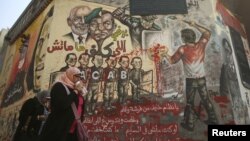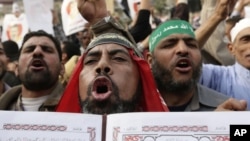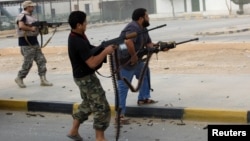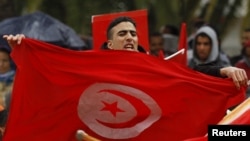The wave of popular uprisings that started in Tunisia two years ago and subsequently swept through much of the Middle East has largely subsided, leaving in its aftermath a tense atmosphere of political and economic uncertainty at best, and deadly conflict at worst.
Looking back and assessing what’s ahead, analysts agree that people who took to the streets in what at the time quickly became known as the “Arab Spring” today face bleak prospects in their quest for the changes they sought.
In Tunisia, instability and social tensions persist, and Middle East analysts say the fear of violence, economic paralysis and political and religious divisions also trouble Egypt, Libya, Yemen, Bahrain and other countries.
In addition, the issues of governance and justice loom large.
Daniel Brumberg is a senior advisor at the U.S. Institute of Peace on issues of democratization. He argues that each country has its own individual dynamics and has to be judged on its own terms.
“In Egypt, from the perspective of President [Mohamed] Morsi and the Muslim Brotherhood, the first goal to pursue was to neutralize the challenge of the military and they have done that quite successfully,” Brumberg said.
He adds, however, that the issue of “transitional justice” has been “pushed aside.” This includes, he explains, mechanisms to prosecute those most responsible for abuses by the previous regime, reparations for victims of the regime, reform of abusive institutions and creating commissions to investigate systematic patterns of abuse.
Brumberg describes a different situation in Tunisia.
“The democratically-elected government has assigned a minister for transitional justice, but he has met resistance from within the Interior Ministry and even from elements of the Justice Ministry itself and the struggle goes on,” he said.
Brumberg pointed to different challenges facing the administration of justice in Libya.
“You have militias with arms, a weak national army and a desire from those militias to take the mission of transitional justice into their hands, which is a real concern,” he said.
F. Gregory Gause, a non-resident senior fellow specializing in domestic politics at Brookings’ Doha Center, believes that the consequences of government weakness severely limit even freely elected governments to do their jobs.
“They do not have functioning bureaucracies to implement policies and, in the Libyan case, they struggled to rebuild police and military forces in the face of militias that are, in many cases, better armed, better funded and better organized,” Gause said.
“Tribal, regional, and sectarian factionalism made political progress in Yemen agonizingly slow, as did tribal and regional divides in Libya,” he added.
Political polarization
While Egypt and Tunisia are not considered weak states, both are suffering from unprecedented political divisions between Islamists and secular groups, says Marina Ottaway, a senior scholar at the Woodrow Wilson Center.
“There is such mistrust between the two sides that even on many issues that they have common goals, especially overcoming the legacy of older regimes, they can’t agree on how to proceed,” Ottaway said.
Daniel Brumberg agrees.
“There is a struggle over identity issues between Islamists and secularists which is really undermining the capacity to create the kind of consensus for peaceful change,” Brumberg said. “Political polarization is definitely disrupting the transition to democracy and even security reform and other transitional justice mechanisms due to the lack of consensus.”
He said that even when an elected administration, the Tunisian government, tried to be inclusive and shared power with secular groups, the Muslim conservative Salafi groups pushed for more Islamic policies thus scaring off secular groups.
Constitution drafting
Marina Ottaway warns that if the secular groups and political parties cannot overcome their divisions, Islamist groups will become dominant. As an example, she cites Egypt.
“Unless the secular parties manage to win more seats in the next parliament, then the constitution risks to be read in such a way that favors the Islamists and might cause a transition to an Islamic state,” she said.
Gause of the Brookings Doha Center shares the same concern.
“In both Egypt and Tunisia, the process of writing a new constitution has polarized society. Strong electoral showings have given Islamist parties the upper hand in the constitution-writing process,” Gause said. “Secular forces are actively opposing, but do not seem able to rally enough support in the society to block the Islamist constitutional projects.”
The economic challenge
In addition to facing political, ethnic and religious tensions, Arab Spring countries are confronted with failing economies.
Ottaway considers this the most daunting challenge of all because these countries have lost tax revenues, their gross domestic products have plummeted, investments have declined and tourism has all but vanished.
Egypt is seen as having lost the most from the collapse of tourism. Cairo's foreign currency reserves have been depleted and there is no incentive for investors to put money on the table.
In the case of Tunisia, Brumberg says, the drop in tourism is coupled with a host of other challenges.
“Besides the fact that tourists are not coming back in huge numbers, there are also many deep structural problems such as dependence on tourism over trade,” Brumberg said. “Much of the Tunisian uprising was about jobs and social issues, but there was no sufficient change to really address the deep economic and social issues which is really fostering Islamic radicalism.”
Experts agree that what complicates the economic challenges confronting the countries of the Arab Spring is that other, richer nations are held back by the global economic downturn.
“There is not much aid available to help troubled economies like the Egyptian and Tunisian economies,” said Brumberg.
Looking back and assessing what’s ahead, analysts agree that people who took to the streets in what at the time quickly became known as the “Arab Spring” today face bleak prospects in their quest for the changes they sought.
In Tunisia, instability and social tensions persist, and Middle East analysts say the fear of violence, economic paralysis and political and religious divisions also trouble Egypt, Libya, Yemen, Bahrain and other countries.
In addition, the issues of governance and justice loom large.
Daniel Brumberg is a senior advisor at the U.S. Institute of Peace on issues of democratization. He argues that each country has its own individual dynamics and has to be judged on its own terms.
“In Egypt, from the perspective of President [Mohamed] Morsi and the Muslim Brotherhood, the first goal to pursue was to neutralize the challenge of the military and they have done that quite successfully,” Brumberg said.
He adds, however, that the issue of “transitional justice” has been “pushed aside.” This includes, he explains, mechanisms to prosecute those most responsible for abuses by the previous regime, reparations for victims of the regime, reform of abusive institutions and creating commissions to investigate systematic patterns of abuse.
Brumberg describes a different situation in Tunisia.
“The democratically-elected government has assigned a minister for transitional justice, but he has met resistance from within the Interior Ministry and even from elements of the Justice Ministry itself and the struggle goes on,” he said.
Brumberg pointed to different challenges facing the administration of justice in Libya.
“You have militias with arms, a weak national army and a desire from those militias to take the mission of transitional justice into their hands, which is a real concern,” he said.
F. Gregory Gause, a non-resident senior fellow specializing in domestic politics at Brookings’ Doha Center, believes that the consequences of government weakness severely limit even freely elected governments to do their jobs.
“They do not have functioning bureaucracies to implement policies and, in the Libyan case, they struggled to rebuild police and military forces in the face of militias that are, in many cases, better armed, better funded and better organized,” Gause said.
“Tribal, regional, and sectarian factionalism made political progress in Yemen agonizingly slow, as did tribal and regional divides in Libya,” he added.
Political polarization
While Egypt and Tunisia are not considered weak states, both are suffering from unprecedented political divisions between Islamists and secular groups, says Marina Ottaway, a senior scholar at the Woodrow Wilson Center.
“There is such mistrust between the two sides that even on many issues that they have common goals, especially overcoming the legacy of older regimes, they can’t agree on how to proceed,” Ottaway said.
Daniel Brumberg agrees.
“There is a struggle over identity issues between Islamists and secularists which is really undermining the capacity to create the kind of consensus for peaceful change,” Brumberg said. “Political polarization is definitely disrupting the transition to democracy and even security reform and other transitional justice mechanisms due to the lack of consensus.”
He said that even when an elected administration, the Tunisian government, tried to be inclusive and shared power with secular groups, the Muslim conservative Salafi groups pushed for more Islamic policies thus scaring off secular groups.
Constitution drafting
Marina Ottaway warns that if the secular groups and political parties cannot overcome their divisions, Islamist groups will become dominant. As an example, she cites Egypt.
“Unless the secular parties manage to win more seats in the next parliament, then the constitution risks to be read in such a way that favors the Islamists and might cause a transition to an Islamic state,” she said.
Gause of the Brookings Doha Center shares the same concern.
“In both Egypt and Tunisia, the process of writing a new constitution has polarized society. Strong electoral showings have given Islamist parties the upper hand in the constitution-writing process,” Gause said. “Secular forces are actively opposing, but do not seem able to rally enough support in the society to block the Islamist constitutional projects.”
The economic challenge
In addition to facing political, ethnic and religious tensions, Arab Spring countries are confronted with failing economies.
Ottaway considers this the most daunting challenge of all because these countries have lost tax revenues, their gross domestic products have plummeted, investments have declined and tourism has all but vanished.
Egypt is seen as having lost the most from the collapse of tourism. Cairo's foreign currency reserves have been depleted and there is no incentive for investors to put money on the table.
In the case of Tunisia, Brumberg says, the drop in tourism is coupled with a host of other challenges.
“Besides the fact that tourists are not coming back in huge numbers, there are also many deep structural problems such as dependence on tourism over trade,” Brumberg said. “Much of the Tunisian uprising was about jobs and social issues, but there was no sufficient change to really address the deep economic and social issues which is really fostering Islamic radicalism.”
Experts agree that what complicates the economic challenges confronting the countries of the Arab Spring is that other, richer nations are held back by the global economic downturn.
“There is not much aid available to help troubled economies like the Egyptian and Tunisian economies,” said Brumberg.







